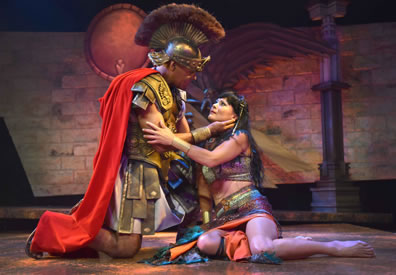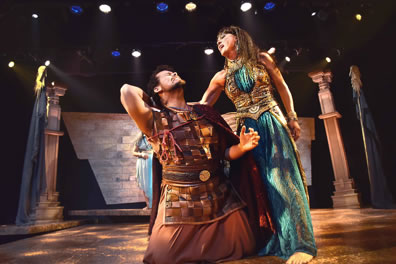Antony and Cleopatra
A Dream Vacation
Orlando Shakespeare Theater in Partnership with UCF, Orlando, Florida
Thursday, April 27, 2017, B–107&108 (center orchestra)
Directed by Joseph Discher
It’s hot. She’s hot. The woman lying on the deck lounger next to me is wearing an olive-green bikini with a serpent jewel fastening both the hip strap and the halter strap. She is irresistible and we are lounging by a pool at an Orlando resort on a sunnyish, 90-degree, breezy spring day surrounded by palm trees, colorful blooms, and attractive vacationing fauna. Work? Who wants to work when you're here?

Antony (Michael Dorn) comforts Cleopatra (Caralyn Kozlowski) in the Orlando Shakespeare Theater production of William Shakespeare's Antony and Cleopatra. Photo by Tony Firriolo, Orlando Shakespeare Theater in Partnership with UCF.
Well, I am working, writing this review of the Orlando Shakespeare Theater's production of William Shakespeare's Antony and Cleopatra. But in my own setting I suddenly feel a greater empathy for Antony. When you’ve got the sexy and sensuous and beguiling Cleopatra by your side, why would you want to get back to the office in Rome, putting down rebellions, keeping your fellow triumvirs in check, and dutifully tending to your wife? I’ve seen many takes on Antony—as an alcoholic, as a youth-centric man caught up in a midlife crisis, as a political has-been—but it never occurred to me that he’s just one of us middle-aged guys who is ready for perpetual vacationing and beguilement. (To clarify, I don’t have a wife back home; she’s the beauty in the serpent-fastened bikini next to me, so when this vacation ends, I’ll at least still be accompanied by beguilement.)
This connection with Antony has more to do with the context of my place than it does with Michael Dorn’s interpretation of Antony in the Orlando Shakes’ production. Dorn doesn’t actually have an interpretation of Antony, unless it be that he’s just bored with all things Cleopatra as well as Rome. Dorn has a resumé rich in movie and television appearances, most notably playing Worf, the Klingon member of the Enterprise crew for 11 seasons of Star Trek: The Next Generation and Star Trek: Deep Space Nine, and in five Star Trek films. As Antony, however, he’s more Vulcan than Klingon, dispassionate and overly logical. Bringing no personality to the part, in the centerpiece pairing his Antony becomes little more than a straight man to the comic readings of Caralyn Kozlowski’s Cleopatra.
However, she more than fills the personality void left by Antony in this rendition of the famous lovers—and while context of my place also might factor into this assessment, she is a Cleopatra no guy in his right mind would leave (granted, she’s also capable of making a guy lose his right mind). We first see her and Antony through a gold-gilded screen in the opening scene making love, she in total command of their mutual climax as the Roman messenger wonders how the great Antony could become such a plaything. Clothing has a lot to say about Cleopatra, too. Costume Designer Yao Chen does expert work, authentically representing the Romans in imperial togas for their council scenes, work-a-day skirts and sandals for their domestic scenes, and legion armor for their war scenes. Chen dresses Cleopatra in a variety of side-slit dresses, see-through wraps, and halter tops, all made of dazzling fabrics, sequins, brocades, feathers, and jewels.
Kozlowski doesn’t merely look sexy; she harnesses her sexual wiles in a performance that is lithe and energetic, at times hopping from one orgasm to the next, be it with Charmian (Sophia Blum in a common-sense reading of the role) or Eros the messenger (Topher Embrey) but always with Antony on her mind. She’s the spoiled princess, she’s the coy flirt, she’s the devious prankster, she’s the passive-aggressive manipulator, she's the physically aggressive diva—all this, and a ruler, too, a calculating politician who combines sexuality and intelligence for her source of power. After Antony catches her receiving the solicitations of Agrippa as ambassador and begins lecturing her (this Antony doesn’t rail), she coolly says. “Not know me yet?” “Cold-hearted toward me?” he replies, a hint petulantly. “Ah, dear, if I be so, from my cold heart let heaven engender hail, and poison it in the source; and the first stone drop in my neck: as it determines, so dissolve my life! The next Caesarion smite!” and Kozlowski violently gestures at her womb, “Till by degrees the memory of my womb together with my brave Egyptians all,”—by now she has moved to the front of the stage, gesturing to take in all the audience as her brave Egyptians—“by the discandying of this pelted storm, lie graveless, till the flies and gnats of Nile have buried them for prey!” This is a queen knowing she is on the verge of ruin and her nation is at the foot of a conqueror, but she's still maneuvering to survive, and keep Antony, too.
This passage is the pivot point for Kozlowski’s portrayal. Her over-the-top reading of Cleopatra for the first half of the play threatens to render the fifth-act queen a hollow character. However, in Kozlowski, Cleopatra begins holding tighter to her love for Antony, borne of true affection, as her power dissolves and her government disintegrates. By the fifth act, her whole existence is grounded in her time spent with Antony: a time past that can only be gained again in death. “I dream’d there was an Emperor Antony,” she says. “O, such another sleep, that I might see but such another man!” Kozlowski delivering Cleopatra’s ode to Antony—“His face was as the heavens; and therein stuck a sun and moon, which kept their course, and lighted the little O, the earth…”—is the high point of this production, giving poetical reverence to an image of a man that stirs our soul.
Jorge Bennett Watson as Enobarbus does dulcet work with the play's most famous speech, the description of Cleopatra first meeting Antony on a barge “like a burnish’d throne.” Watson displays sensual verse-speaking skills in his portrayal of Antony’s second in command, but, as he’s about to begin his barge speech, a soundtrack of mood music rises over the stage, the only time, other than during scene changes, we get such accompaniment. It’s a cue to the audience that this is a famous speech, so pay attention! though it actually undermines the moment, for Watson is fully capable of arresting the audience’s attention with just his voice.
This is the only intrusive misstep in Joseph Discher’s direction, despite the myriad trims he makes to Shakespeare’s text. Getting the play down to 2 1/2 hours, including intermission, Discher keeps the plot and character relationships intact while diminishing the play’s geographic scope. He also condenses the dramatic personae from the original 40-plus to 17 named characters. In doing so, he combines several roles into one. For example, the two Romans in the opening scene, Philo and Demetrius, here are Agrippa and Enobarbus. Agrippa (Kody Grassett) takes on almost all the duties of the various Roman soldiers serving Octavius, becoming a key character with an ongoing camaraderie with Enobarbus. Somehow, Agrippa's character arc remains true even as he becomes the messenger whipped by Antony for his insolence (and as representative of Octavius’s lack of respect for Antony). Proculeius (Shane Taylor) merges with Dolabella as Octavius’s embassy to Cleopatra in the final scene. This choice loses Shakespeare’s subtle display of Antony’s lack of judgment even at his death when he tells Cleopatra to trust none but Proculeius, who ends up betraying her before Dolabella proves to be the one who helps her achieve her ends. This is a quibbling point, though, given how Taylor’s Proculeius becomes mesmerized by Cleopatra, essentially evolving into the character of Dolabella as a result.
In Cleopatra’s company, Mardian the eunuch (Blaine Edwards) is the one who brings Cleopatra “the worm” in the final act, eunuch and the cast list's “clown” being one and the same in performance throughout the play. Among Antony's entourage, the character of Eros, Antony’s aide de camp, is expanded to entail the various messengers to Cleopatra, including the one she beats when he reports on Antony’s marriage to Octavia. With the role thus expanded, Embrey gives a show-stealing performance, the poor guy trying to serve his distracted master while dealing with the queen's abuse. Embrey’s Eros is true; he’s also rightfully confused and scared.

Cleopatra (Caralyn Kozlowski) attacks Eros (Topher Embrey) for his reporting on Antony's marraige to Octavia in the Orlando Shakespeare Theater production of William Shakespeare's Antony and Cleopatra. Photo by Tony Firriolo, Orlando Shakespeare Theater in Partnership with UCF.
He gets a crowning moment in a fascinating textual interpolation. As he’s helping Antony put on his armor, Cleopatra also is assisting, though she really doesn’t know anything about Roman armor. However, Antony takes his ire out on Eros, and when the general curtly dismisses him, Eros walks past Antony but is blocked by Cleopatra, who takes hold of his face and kisses him on the lips. Eros is stunned and doesn’t know what to make of this gesture, though it’s obvious to us that Kozlowski’s Cleopatra is thanking him for his honest service to Antony and to her, too. It's better than a medal.
The part of Lepidus (Taylor), the third triumvir, grows, too. It is he who suggests that Antony marry Octavius’s sister, Octavia (Roberta Emerson, who doubles as a shy Iras). With a presence greater than that of the text's, Taylor’s Lepidus shows a bit more political prowess and personal power than perhaps Shakespeare intended. Rodney Lizcano, meanwhile, plays Octavius as an emperor-in-the making in both skill and arrogance.
This is our first experience with the Orlando Shakespeare Theater, and the production values are laudable, in addition to Chen’s costumes. Jim Hunter’s scene design features a mottled gold stage with stone walls at the back and sides, and the sculpture of a giant eagle in flight at the back. The eagle, generally under a red glow, is bathed in white when Antony gets “a Roman thought” (lighting design by Kevin Griffin). Britt Sandusky’s sound design is, other than that accompaniment for the barge speech, unobtrusively effective. Discher brings the action off the stage into the aisles of the small auditorium, and both Watson’s Enobarbus and Kozlowski’s Cleopatra engage in direct-address with the audience.
Ultimately, this production belongs to Cleopatra and Kozlowski’s subtly over-the-top performance of the beguiling Egyptian queen. She is a dream vacation in and of herself, hard to let go and go home.
Eric Minton
April 29, 2017
Comment: e-mail editorial@shakespeareances.com
Start a discussion in the Bardroom



 Find additional Shakespeareances
Find additional Shakespeareances